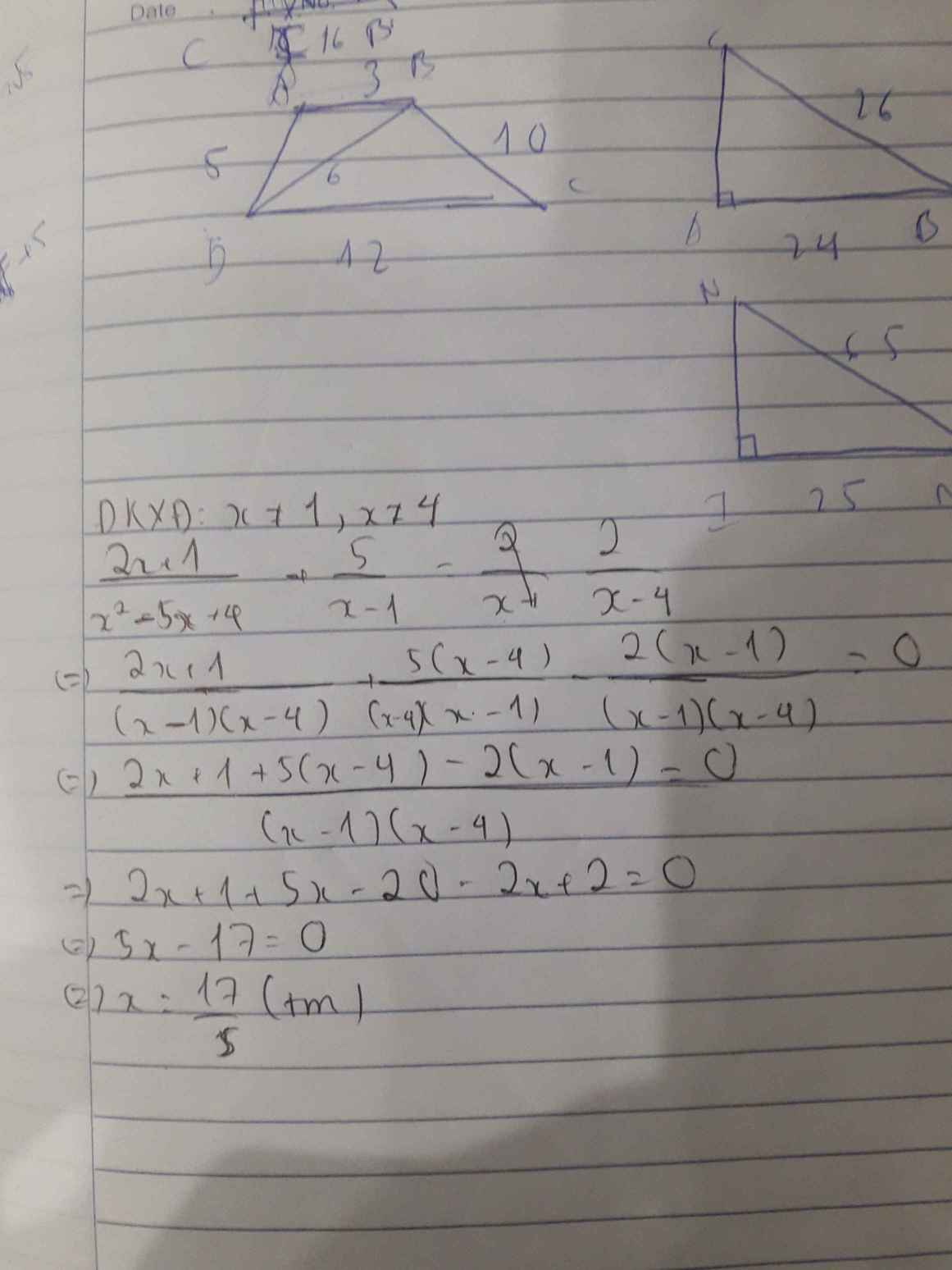giải phương trình: \(\dfrac{4}{x+2}-\dfrac{1}{x}=\dfrac{x^2-2}{x^2+2x}\)

Những câu hỏi liên quan
giải các phương trình sau
1, \(\dfrac{-3}{x-4}-\dfrac{3-5x}{x^2-16}=\dfrac{1}{x+4}\)
2, \(\dfrac{3}{2+x}-\dfrac{x-1}{x^2-4}=\dfrac{2}{x-2}\)
3, \(\dfrac{x-5}{2x-3}-\dfrac{x}{2x+3}=\dfrac{1-6x}{4x^2-9}\)
1: Ta có: \(\dfrac{-3}{x-4}-\dfrac{3-5x}{x^2-16}=\dfrac{1}{x+4}\)
Suy ra: \(-3\left(x+4\right)-3+5x=x-4\)
\(\Leftrightarrow-3x-12-3+5x-x+4=0\)
\(\Leftrightarrow x=11\left(nhận\right)\)
Đúng 0
Bình luận (0)
2. ĐKXĐ: $x\neq \pm 2$
PT \(\Leftrightarrow \frac{3(x-2)}{(2+x)(x-2)}-\frac{x-1}{(x-2)(x+2)}=\frac{2(x+2)}{(x-2)(x+2)}\)
\(\Leftrightarrow \frac{3(x-2)-(x-1)}{(x-2)(x+2)}=\frac{2(x+2)}{(x-2)(x+2)}\)
\(\Rightarrow 3(x-2)-(x-1)=2(x+2)\)
\(\Leftrightarrow 2x-5=2x+4\Leftrightarrow 9=0\) (vô lý)
Vậy pt vô nghiệm
Đúng 0
Bình luận (0)
3. ĐKXĐ: $x\neq \pm \frac{3}{2}$
PT \(\Leftrightarrow \frac{(x-5)(2x+3)-x(2x-3)}{(2x-3)(2x+3)}=\frac{1-6x}{(2x-3)(2x+3)}\)
\(\Rightarrow (x-5)(2x+3)-x(2x-3)=1-6x\)
\(\Leftrightarrow 2x^2-7x-15-2x^2+3x+6x-1=0\)
\(\Leftrightarrow 2x-16=0\Leftrightarrow x=8\) (thỏa mãn)
Đúng 0
Bình luận (0)
giải các phương trình sau
1, \(\dfrac{3}{2+x}-\dfrac{x-1}{x^2-4}=\dfrac{2}{x-2}\)
2, \(\dfrac{x-5}{2x-3}-\dfrac{x}{2x+3}=\dfrac{1-6x}{4x^2-9}\)
1: Ta có: \(\dfrac{3}{x+2}-\dfrac{x-1}{x^2-4}=\dfrac{2}{x-2}\)
Suy ra: \(3x-6-x+1=2x+4\)
\(\Leftrightarrow2x-5=2x+4\left(vôlý\right)\)
2: Ta có: \(\dfrac{x-5}{2x-3}-\dfrac{x}{2x+3}=\dfrac{1-6x}{4x^2-9}\)
Suy ra: \(\left(x-5\right)\left(2x+3\right)-x\left(2x-3\right)=1-6x\)
\(\Leftrightarrow2x^2-7x-15-2x^2+6x+6x-1=0\)
\(\Leftrightarrow5x=16\)
hay \(x=\dfrac{16}{5}\)
Đúng 1
Bình luận (0)
a\(8\left(x+\dfrac{1}{x}\right)^{2^{ }}+4\left(x^{2^{ }}+\dfrac{1}{x^2}\right)-4\left(x^2+\dfrac{1}{x^2}\right)\left(x+\dfrac{1}{x}\right)=\left(x+4\right)^2\)giải các phương trình\(\dfrac{x+4}{2x^2-5x+2}+\dfrac{x+1}{2x^2-7x+3}=\dfrac{2x+5}{2x^2-7x+3}\)
b)
ĐKXĐ: \(x\notin\left\{2;3;\dfrac{1}{2}\right\}\)
Ta có: \(\dfrac{x+4}{2x^2-5x+2}+\dfrac{x+1}{2x^2-7x+3}=\dfrac{2x+5}{2x^2-7x+3}\)
\(\Leftrightarrow\dfrac{x+4}{\left(x-2\right)\left(2x-1\right)}+\dfrac{x+1}{\left(x-3\right)\left(2x-1\right)}=\dfrac{2x+5}{\left(2x-1\right)\left(x-3\right)}\)
\(\Leftrightarrow\dfrac{\left(x+4\right)\left(x-3\right)}{\left(x-2\right)\left(2x-1\right)\left(x-3\right)}+\dfrac{\left(x+1\right)\left(x-2\right)}{\left(x-2\right)\left(x-3\right)\left(2x-1\right)}=\dfrac{\left(2x+5\right)\left(x-2\right)}{\left(2x-1\right)\left(x-3\right)\left(x-2\right)}\)
Suy ra: \(x^2-3x+4x-12+x^2-2x+x-2=2x^2-4x+5x-10\)
\(\Leftrightarrow2x^2-14=2x^2+x-10\)
\(\Leftrightarrow2x^2-14-2x^2-x+10=0\)
\(\Leftrightarrow-x-4=0\)
\(\Leftrightarrow-x=4\)
hay x=-4(nhận)
Vậy: S={-4}
Đúng 1
Bình luận (0)
Giải các phương trình sau: (TM ĐK) 1) dfrac{11}{x}dfrac{9}{x+1}+dfrac{2}{x-4} 2) dfrac{14}{3x-12}-dfrac{2+x}{x-4}dfrac{3}{8-2x}-dfrac{5}{6} 3) dfrac{x+5}{x^2-5x}-dfrac{x+25}{2x^2-50}dfrac{x-5}{2x^2+10} 4) dfrac{x+1}{x-1}-dfrac{x-1}{x+1}dfrac{16}{x^2-1} 5) left(1-dfrac{x-1}{x+1}right)left(x+2right)dfrac{x+1}{x-1}+dfrac{x-1}{x+1} mng giúp mk bài này nha. Cảm ơn bạn nhiều
Đọc tiếp
Giải các phương trình sau: (TM ĐK)
1) \(\dfrac{11}{x}=\dfrac{9}{x+1}+\dfrac{2}{x-4}\)
2) \(\dfrac{14}{3x-12}-\dfrac{2+x}{x-4}=\dfrac{3}{8-2x}-\dfrac{5}{6}\)
3) \(\dfrac{x+5}{x^2-5x}-\dfrac{x+25}{2x^2-50}=\dfrac{x-5}{2x^2+10}\)
4) \(\dfrac{x+1}{x-1}-\dfrac{x-1}{x+1}=\dfrac{16}{x^2-1}\)
5) \(\left(1-\dfrac{x-1}{x+1}\right)\left(x+2\right)=\dfrac{x+1}{x-1}+\dfrac{x-1}{x+1}\)
mng giúp mk bài này nha. Cảm ơn bạn nhiều
\(1,\left(dk:x\ne0,-1,4\right)\)
\(\Leftrightarrow\dfrac{9}{x+1}+\dfrac{2}{x-4}-\dfrac{11}{x}=0\)
\(\Leftrightarrow\dfrac{9x\left(x-4\right)+2x\left(x+1\right)-11\left(x+1\right)\left(x-4\right)}{x\left(x+1\right)\left(x-4\right)}=0\)
\(\Leftrightarrow9x^2-36x+2x^2+2x-11x^2+44x-11x+44=0\)
\(\Leftrightarrow-x=-44\)
\(\Leftrightarrow x=44\left(tm\right)\)
\(2,\left(đk:x\ne4\right)\)
\(\Leftrightarrow\dfrac{14}{3\left(x-4\right)}-\dfrac{2+x}{x-4}-\dfrac{3}{2\left(x-4\right)}+\dfrac{5}{6}=0\)
\(\Leftrightarrow\dfrac{14.2-6\left(2+x\right)-3.3+5\left(x-4\right)}{6\left(x-4\right)}=0\)
\(\Leftrightarrow28-12-6x-9+5x-20=0\)
\(\Leftrightarrow-x=13\)
\(\Leftrightarrow x=-13\left(tm\right)\)
Đúng 2
Bình luận (2)
Giải các phương trình sau:
a) \(\dfrac{1}{x^2-2x+2}\) + \(\dfrac{2}{x^2-2x+3}\) = \(\dfrac{6}{x^2-2x+4}\)
b) \(\dfrac{x^2+2x+7}{\left(x+1\right)^2+2}\) = x2 + 2x + 4
b) Đặt \(x^2+2x+3=a\)(a>0)
Ta có: \(\dfrac{x^2+2x+7}{\left(x+1\right)^2+2}=x^2+2x+4\)
\(\Leftrightarrow\dfrac{x^2+2x+7}{x^2+2x+1+2}=x^2+2x+4\)
\(\Leftrightarrow\dfrac{x^2+2x+7}{x^2+2x+3}=x^2+2x+4\)
\(\Leftrightarrow\dfrac{a+4}{a}=a+1\)
\(\Leftrightarrow a^2+a=a+4\)
\(\Leftrightarrow a^2=4\)
\(\Leftrightarrow\left[{}\begin{matrix}a=2\left(nhận\right)\\a=-2\left(loại\right)\end{matrix}\right.\)
\(\Leftrightarrow x^2+2x+3=2\)
\(\Leftrightarrow x^2+2x+1=0\)
\(\Leftrightarrow\left(x+1\right)^2=0\)
\(\Leftrightarrow x+1=0\)
hay x=-1
Vậy: S={-1}
Đúng 2
Bình luận (1)
ĐKXĐ của cả 2 pt trên đều là `x in RR`
`a,1/(x^2-2x+2)+2/(x^2-2x+3)=6/(x^2-2x+4)`
Đặt `a=x^+2x+3(a>=2)` ta có:
`1/(a-1)+2/a=6/(a+1)`
`<=>a(a+1)+2(a-1)(a+1)=6a(a-1)`
`<=>a^2+a+2(a^2-1)=6a^2-6a`
`<=>a^2+a+2a^2-2=6a^2-6a`
`<=>3a^2-5a+2=0`
`<=>3a^2-3a-2a+2=0`
`<=>3a(a-1)-2(a-1)=0`
`<=>(a-1)(3a-2)=0`
`a>=2=>a-1>=1>0`
`a>=2=>3a-2>=4>0`
Vậy pt vô nghiệm
`(x^2+2x+7)/((x+1)^2+2)=x^2+2x+4`
`<=>(x^2+2x+7)=(x^2+2x+4)(x^2+2x+3)`
Đặt `a=x^2+2x+3(a>=2)`
`pt<=>a+4=a(a+1)`
`<=>a^2+a=a+4`
`<=>a^2=4`
`<=>a=2` do `a>=2`
`<=>(x+1)^2+2=2`
`<=>(x+1)^2=0`
`<=>x=-1`
Vậy `S={-1}`
Đúng 3
Bình luận (0)
Giải phương trình: \(A=\dfrac{1}{x^2-2x+2}+\dfrac{2}{x^2-2x+3}=\dfrac{6}{x^2-2x+4}\)
Đặt \(x^2-2x+2=t\)
\(\Rightarrow x^2-2x+3=t+1\)
\(\Rightarrow x^2-2x+4=t+2\)
\(pt\Leftrightarrow \frac{1}{t}+\frac{2}{t+1}=\frac{6}{t+2}\)
\(\Rightarrow (t+1)(t+2)+2t(t+2)=6t(t+1)\)
\(\Leftrightarrow t^2+3t+2+2t^2+4t=6t^2+6t\)
\(\Leftrightarrow 3t^2-t-2=0\)
TH1\( : t=1\)
\(\Rightarrow x^2-2x+2=1\)
\(\Leftrightarrow x=1\)
TH2:\(t=\frac{-2}{3}\) (loại)
Vậy \(x=1\)
Đúng 2
Bình luận (0)
Giải phương trình 1, dfrac{1-6x}{x-2}+dfrac{9x+4}{x+2}dfrac{xleft(3x-2right)+1}{x^2-4}2, dfrac{3x+2}{3x-2}-dfrac{6}{2-3x}dfrac{9x^2}{9x^2-4}3, dfrac{x-1}{x}+dfrac{1}{x+1}dfrac{2x-1}{2x^2+2}4, dfrac{2}{x+1}+dfrac{3x+1}{x+1}dfrac{1}{left(x+1right)left(x-2right)}5, dfrac{x+5}{3x-6}-dfrac{1}{2}dfrac{2x-3}{2x-4}
Đọc tiếp
Giải phương trình
1, \(\dfrac{1-6x}{x-2}+\dfrac{9x+4}{x+2}=\dfrac{x\left(3x-2\right)+1}{x^2-4}\)
2, \(\dfrac{3x+2}{3x-2}-\dfrac{6}{2-3x}=\dfrac{9x^2}{9x^2-4}\)3, \(\dfrac{x-1}{x}+\dfrac{1}{x+1}=\dfrac{2x-1}{2x^2+2}\)4, \(\dfrac{2}{x+1}+\dfrac{3x+1}{x+1}=\dfrac{1}{\left(x+1\right)\left(x-2\right)}\)5, \(\dfrac{x+5}{3x-6}-\dfrac{1}{2}=\dfrac{2x-3}{2x-4}\)
1) ĐKXĐ: \(x\notin\left\{2;-2\right\}\)
Ta có: \(\dfrac{1-6x}{x-2}+\dfrac{9x+4}{x+2}=\dfrac{x\left(3x-2\right)+1}{x^2-4}\)
\(\Leftrightarrow\dfrac{\left(1-6x\right)\left(x+2\right)}{\left(x-2\right)\left(x+2\right)}+\dfrac{\left(9x+4\right)\left(x-2\right)}{\left(x+2\right)\left(x-2\right)}=\dfrac{3x^2-2x+1}{\left(x-2\right)\left(x+2\right)}\)
Suy ra: \(\left(1-6x\right)\left(x+2\right)+\left(9x+4\right)\left(x-2\right)=3x^2-2x+1\)
\(\Leftrightarrow x+2-6x^2-12x+9x^2-18x+4x-8-3x^2+2x-1=0\)
\(\Leftrightarrow-23x-7=0\)
\(\Leftrightarrow-23x=7\)
\(\Leftrightarrow x=-\dfrac{7}{23}\)(nhận)
Vậy: \(S=\left\{-\dfrac{7}{23}\right\}\)
2) ĐKXĐ: \(x\notin\left\{\dfrac{2}{3};-\dfrac{2}{3}\right\}\)
Ta có: \(\dfrac{3x+2}{3x-2}-\dfrac{6}{2-3x}=\dfrac{9x^2}{9x^2-4}\)
\(\Leftrightarrow\dfrac{3x+2}{3x-2}+\dfrac{6}{3x-2}=\dfrac{9x^2}{\left(3x-2\right)\left(3x+2\right)}\)
\(\Leftrightarrow\dfrac{3x+8}{3x-2}=\dfrac{9x^2}{\left(3x-2\right)\left(3x+2\right)}\)
\(\Leftrightarrow\dfrac{\left(3x+8\right)\left(3x+2\right)}{\left(3x-2\right)\left(3x+2\right)}=\dfrac{9x^2}{\left(3x-2\right)\left(3x+2\right)}\)
Suy ra: \(9x^2+6x+24x+16=9x^2\)
\(\Leftrightarrow30x+16=0\)
\(\Leftrightarrow30x=-16\)
hay \(x=-\dfrac{8}{15}\)(nhận)
Vậy: \(S=\left\{-\dfrac{8}{15}\right\}\)
Đúng 2
Bình luận (0)
giải phương trình 1)dfrac{1-6x}{x-2}+dfrac{9x+4}{x+2}dfrac{xleft(3x-2right)+1}{x^2-4}2) dfrac{3x+2}{3x-2}-dfrac{6}{2+3x}dfrac{9x^2}{9x^2-4}3) dfrac{x+5}{3x-6}-dfrac{1}{2}dfrac{2x-3}{2x-4}4) dfrac{x-1}{x}+dfrac{1}{x+1}dfrac{2x-1}{2x^2+2}5) dfrac{2}{x+1}+dfrac{3x+1}{x+1}dfrac{1}{left(x+1right)left(x-2right)}
Đọc tiếp
giải phương trình 1)\(\dfrac{1-6x}{x-2}+\dfrac{9x+4}{x+2}=\dfrac{x\left(3x-2\right)+1}{x^2-4}\)2) \(\dfrac{3x+2}{3x-2}-\dfrac{6}{2+3x}=\dfrac{9x^2}{9x^2-4}\)3) \(\dfrac{x+5}{3x-6}-\dfrac{1}{2}=\dfrac{2x-3}{2x-4}\)4) \(\dfrac{x-1}{x}+\dfrac{1}{x+1}=\dfrac{2x-1}{2x^2+2}\)5) \(\dfrac{2}{x+1}+\dfrac{3x+1}{x+1}=\dfrac{1}{\left(x+1\right)\left(x-2\right)}\)
giúp mình với ạ câu nào cũng được
Đúng 0
Bình luận (0)
Giải phương trình:
\(\dfrac{2x+1}{x^2-5x+4}+\dfrac{5}{x-1}=\dfrac{2}{x-4}\)
ĐKXĐ: ` x ne 1 ; x ne 4`
`(2x+1)/(x^2-5x+4) + 5/(x-1) = 2/(x-4)`
`<=> (2x+1)/[(x-1)(x-4)] + [5(x-4)]/[(x-1)(x-4)] = [2(x-1)]/[(x-1)(x-4)]`
`=> 2x+1 + 5x -20 = 2x-2`
`<=> 5x = 17`
`<=> x= 17/5`(thỏa mãn ĐKXĐ)
Vậy tập nghiệm của phương trình là `S={ 17/5}`
Đúng 2
Bình luận (0)




















